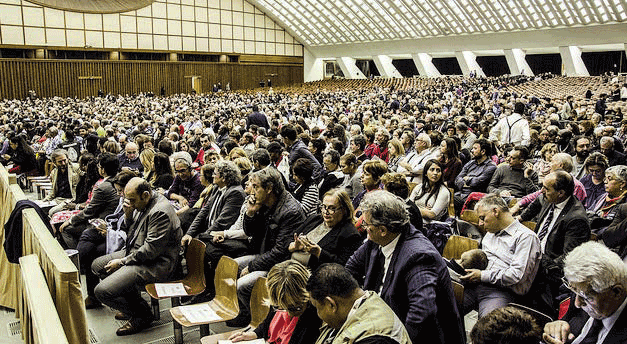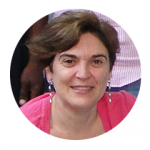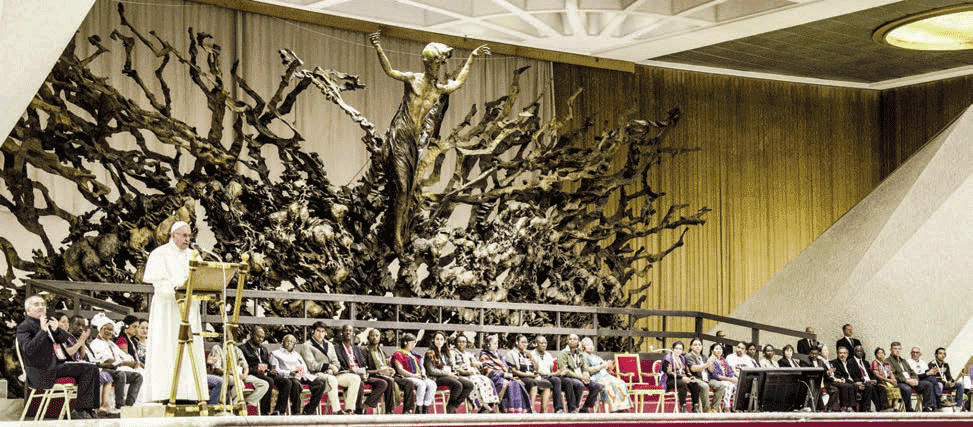Around 150 people from more than 65 countries find again in Rome. We were summoned by the "sacred rights" of Land, Lodging and Labour (the 3L), which are still violently violated throughout the planet. Again the cry of popular movements that another world is possible, that it is possible to be better people.
The MEETING, promoted by pope Francis and convened by the Pontifical Council for Justice and Peace together with the Organizing Committee of the Popular Movements, has been, once again, a beautiful gift. Men and women coming from diverse struggles, cultures, religions, with a great thirst for justice and solidarity, transformation, hope ... "social poets" in pope Francis’s words. The Third Meeting of Popular Movements has been "a sign of the times" for all the participants, but also for all people who believe in the strength of peoples, in their prominence as a key issue in the processes of change in our societies. Among others, several delegates of the WMCW have been able to participate, Xavier of the ACO of France, Manolo of HOAC of Spain, Edilma of the Guatemala MCW, Ramón of Dominican Republic MCW, Mª Josefa of Cuba MCW, Manolo Copé coordinator of the ECWM and myself.
Work done
"The days passed in a climate of respect, tolerance and democratic dialogue, between women and men of diverse cultures, languages, religions and ideologies. We also discussed on a decent housing to which every human being has right; and work and fair salary where people are not instruments of the powerful but all united we can improve the harsh reality of our peoples imposed by the culture of selfishness. (Maria Josefa Cuba MCW)
At the meeting there have been various dialogues and reflections about issues affecting the lives of millions of people. The 3L appear with great strength in the workshops and in the debates, since it is urgent to continue developing public policies that offer people three basic conditions for their subsistence: a land where they can cultivate; a decent job, but also a social salary that lets jobless workers and their families live with a minimum of dignity; and home and neighbourhoods that are welcoming spaces for people and their families, with conditions and infrastructures that guarantee housing, health, education or culture. In addition to the 3L we have raised three essential situations on the international scene. These are the panels: People and Democracy; Territory and Nature; And Refugees and Displaced People. I point out some proposals. In the first of them, the urgent need people participate in the decision-making face to the dismembered democracies. The building of an "agenda of social movements" that influences on governments, promotes participatory democracy and the dialogue with public institutions.
Faced with the ecological crisis of first magnitude with multiple consequences for the people, the answers go through an approach of what the pope calls "integral ecology". The care of "mother earth", the proposals to "create and strengthen global networks to plan and coordinate actions in defence of the environment. To practice the triple R: "Reduce, Reuse, Recycle to promote changes in practices and to lessen levels of pollution of the environment". Or the requirement of "the application of the right to consultation set out in ILO Resolution 169 [on Indigenous and Tribal Peoples], for any initiative to be developed in their territories".
Before the tragedy of migrants and refugees, the forced migration is a dehumanising act "because of" harassment, discrimination and criminalization by the authorities of the countries to which we arrived. " The culture of fraternity, of welcome, claims the existence of "a universal citizenship". The creation of a global fund, within the framework of the United Nations, that allows immediate intervention in situations of risk; or the international recognition of migrants and displaced persons for reasons of hunger and economic status under the status of "refugees". We share the experience of great fighters. I would like to highlight to Vandana Shiva, a well-known ecofeminist, who pointed out that "all those who defend nature and the rights of peoples are persecuted." With these added difficulties, Shiva pointed to the importance of "living as the Almighty has asked for, respecting the earth and the creation." Each of us "is Earth. We are not separate from it. The powerful built a separation, which is called ecoapartheid: in our consciousness and in the reality, creating people without a home and without land. The revolution is to return to our "common house", the Earth, as the Pope says. But, once at home, we must respect it. " I would also to like to emphasize the participation of the ex- president Mujica, clear planetary example for his coherence and simplicity. "The necessary cultural change", he underlined in his intervention, cultural change which goes beyond the structural changes that do not change the behaviour of people and therefore, it poses a culture "from capitalist values" and whose seal is the market which "imposes the bulk of the decisions".
Proposals for action

The meeting has resulted in three documents: 1) Proposals for Transforming Action; 2) The synthesis of the work of the meeting, which underlies and deepens the proposals for transforming action. And 3) the 41 motions and petitions addressed to the Pope, the authorities and the peoples of the countries on certain situations and problems.
The Proposals for Transforming Action have been the most binding document of the meeting and ratified "that the common and structural cause of the socio-environmental crisis is the tyranny of money, that is, the prevailing capitalist system and an ideology that does not respect human dignity" . It was our comrade Edilma from the MCW of Guatemala who was in charge of reading the final conclusions to Pope Francis and the rest of the participants in the meeting. These are the seven proposals: 1) We want to remind Berta Cáceres, spokeswoman for our first meeting, murdered for promoting processes of change and we demand the end of the persecution of all popular fighters. The people defend the right to peace, based on social justice. 2) In the perspective of a participatory and full democracy, we propose to promote institutional mechanisms that guarantee the effective access of the popular movements, native communities and the people, to political and economic decision-making. 3) In the perspective of the universal destiny of the goods of nature, we reject the privatization of water and demand that it be considered a good of public domain, in line with the United Nations Declaration so that no person is deprived of access to this basic human right.
4) In the perspective of an integral and popular agrarian reform, we propose to prohibit the patenting and genetic manipulation of all life forms, particularly seeds. We ratify the defence of food sovereignty and the human right to a healthy diet, without pesticides, to end the serious nutritional problems suffered by billions of people.
5) In the perspective of a fair labour reform that guarantees full access to decent work, we propose to implement a universal social salary for all workers whether in the public, private or popular sector. 6) In the perspective of an inclusive urban reform that guarantees the access to decent housing and habitat, we propose to declare the inviolability of the family home, to eradicate the evictions that leave homeless families. 7) In the perspective of building bridges between peoples, we propose to build a universal citizenship that, without ignoring the original identities, demolish the walls of exclusion and xenophobia, accepting with dignity those who are forced to leave their home. They are called to "work together with Francis so that these proposals can become effective reality as enforceable and respected rights at local, national and international level. We encourage local churches to realise the Pope's messages".
Yes, we are accompanied!
"You are going to be wrong many times ... but it is love that builds a dignified life". "I congratulate you, I accompany you, I ask you to continue to open paths and to fight. That gives me strength, gives us strength ... is taking root" said Francis welcoming the works presented. There are many words of Pope Francis that help us to continue walking, building, encouraging. I invite you to read in depth the text of the pope that, for reasons of space, I cannot reproduce here, but I can share some of his contributions, which are like a breath of fresh air that helps us in spite of the difficulties. "That unjust structure linking all the forms of exclusion that you experience, can stiffen and become a whip, an existential whip that, as in the Egypt of the Old Testament, enslaves and robs of freedom. Some it lashes mercilessly, while constantly threatening others, in order to herd everyone, like cattle, to wherever the god of money chooses.
What governs then? Money. How does it govern? With the whip of fear, of inequality, of economic, social, cultural and military violence, which spawns ever greater violence in a seemingly unending downward spiral. So much pain and so much fear! There is – I said not long ago – a basic terrorism that is born of the overall control of money worldwide and strikes at humanity as a whole. But terrorism begins when “you drive out the marvel of creation, man and woman, and put money in their place. That system is terrorist. The entire social doctrine of the Church and the magisterium of my predecessors rejects the idolatry of money that reigns rather than serves, that tyrannizes and terrorizes humanity. And in the face of this "cold breath of fear", he proposes to us mercy, that is, to love people, to be moved by the suffering of the other, to react and to advance in the construction of a new humanity.
Pope Francis endorsed the cry of the "3L" whose humble intelligence favours the bridge-project of peoples as opposed to the wall-project of money” and that “aims at integral human development” against the moral atrophy of this system that prevents the development of the human being in his integrity, developing hyperconsumption, an enormous gap of inequality and a profound deterioration of the "common house." Faced with the shame of the tragedy of migrants, refugees and displaced persons "as a result of an unjust socio-economic system and of the warlike conflicts they did not seek" ... Francisco asks the popular movements "to exercise this special solidarity that exists between people who have suffered (...) Perhaps by your example and your persistence, some states and international agencies may open their eyes and take suitable measures to receive and fully integrate the lives of so many people. “Giving example and advocacy are ways of engaging in political life” that Francisco wants to see completed with " getting involved in the great discussions", in consistency with that phrase that often repeats “Politics is one of the highest forms of charity, of love”, "but at the same time he pointed to two risks in the relationship between popular movements and politics: "letting oneself get put in a straitjacket", as an uncritical acceptance of social policy towards the poor but without the poor" that reduces them to mere managers of the existing misery "; and "letting oneself be corrupted," which is a vice from which nothing and no one is exempt, for which the best antidote is that those who choose to live a life of service to others, acting honestly and with "a strong sense of austerity and humility”, clarifying that this austerity is moral and humane, and" it is the way of living, in how I go about my life, my family. "
The WMCW contribution.
"What is important for the workers and the popular classes is the analysis and concrete proposals in order to obtain solutions. A Church that opens up and listens to the most disadvantaged people and sees the people standing still despite the difficult situations they experience. For our movements, we must be aware of what happens in other countries that, despite living situations that could not be more painful for many people, still stand and fight worthy ... It is our job to make alternative proposals to these situations. (Xavier ACO France) "We all have participated, we have hope, creativity, utopia ... We believe in the necessity of the participation of the people in political life with the conviction that this world will change and transform." (Manolo HOAC Spain) "These days have been a realization that it is possible to work side by side, believers and non-believers, to whom we are united by the same thirst for justice, the same desire to make this world a friendlier place .... I came as ECWM coordinator, because in this space of European coordination we are convinced of the need to have a meeting of these characteristics at the continental level. I was charged with taking steps to concretise this reality in Europe. " (Manolo Copé, ECWM coordinator)
It is essential the WMCW contribution in these meetings but also in the future work that we have to develop as an international movement. - to read and to reflect on our movements the conclusions of the meeting and to see in each continent in each country how we can work together, it is a first task.
- among the conclusions of the meeting, the fifth proposal "the need for a just labour reform that guarantees full access to decent work, we propose to implement a universal social salary for all workers, whether public, private or popular", is in absolute In line with the work we have been developing in recent years in the WMCW. It is fundamental to continue in this line of action for the next years and that the work that we have begun to develop with the 7th October campaigns implements in all the places where we are present.
- in July 2017 we will hold our world meeting, we will have the possibility of collecting Pope Francis’s contributions and interpellations he makes to us to concretise our future plan of action in the WMCW.

Charo Castelló, activist, co-president of the World Movement of Christian Workers and member of the organizing committee of Popular Movements Meeting.





